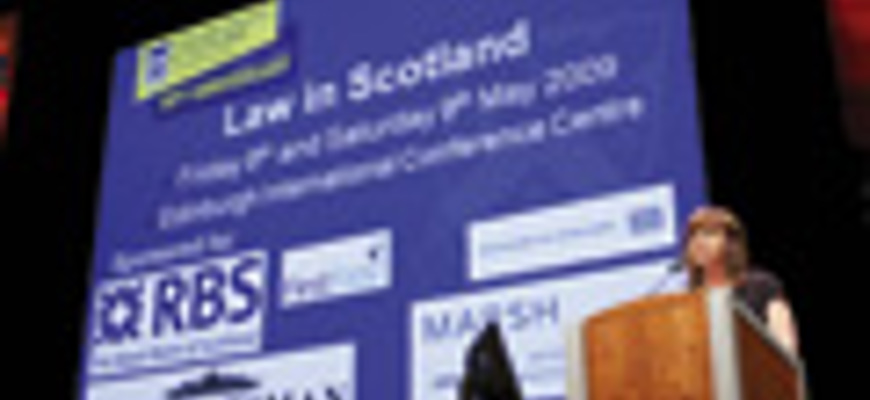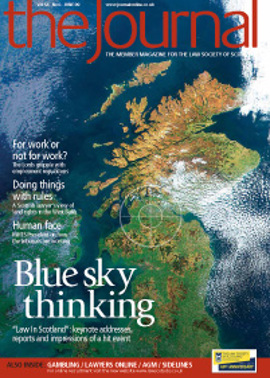Advance on all fronts

The keynote address at the leading legal conference in 1949, had there been one, would no doubt have focused on the passage of the Legal Aid and Solicitors (Scotland) Act, its central provision the establishment of the Law Society of Scotland along with a new system for making payments of legal aid. Other sessions might have considered the ongoing debate about the validity of the Parliament Act, with its limitation of the delaying powers available to the House of Lords. Over lunch, delegates would likely have grumbled about the continued imposition of rationing.
Unfortunately, they would have to wait five more years before food rationing finally ended. Within 20 years man would land on the moon, and 60 years on, two women law officers, from either side of the border, would share the platform at the opening session of a conference now firmly established in the legal calendar.
Delivering her keynote speech at this year’s 60th anniversary conference, Lord Advocate Elish Angiolini pointed out that delegates back in 1949 would have had difficulty deciding which was least likely – space travel or the appointment of female law officers. Thankfully, the Society and the solicitors’ profession have changed in many and substantial ways since the post-war era, not least in terms of diversity.
The challenges and opportunities facing today’s legal profession were reflected throughout the “Law in Scotland” conference. The Lord Advocate and Baroness Scotland, the Attorney General for England, Wales & Northern Ireland, opened the event by jointly announcing a new cross-border protocol to deal with terrorism offences across UK jurisdictions, citing the bombing attempts at Glasgow Airport and in the Haymarket area of London as evidence of the need for close co-operation between investigating and prosecuting authorities. Then the closing plenary by Lord Bonomy outlined the development of international courts and tribunals as far afield as the former Yugoslavia, Rwanda, Cambodia, Iraq and East Timor – as well as numerous other conflict zones – in an attempt to maintain the rule of law across the modern world.
Motivators
The programme the following day began over a buffet breakfast with a motivational speech by three-time Olympic rowing medallist and Edinburgh University law graduate Katherine Grainger. Lawyers feeling inspired to take up a challenge were straightaway thrust into “adapt or die” visions of the future delivery of legal services, courtesy first of the consultant and author Richard Susskind (see p 42 of this issue), and then a panel debate. Well chaired by the Scotsman’s David Lee, this involved, among others, the Cabinet Secretary for Justice, Kenny MacAskill – who also took the opportunity to break the news that he had decided to leave unchanged the unique size of the Scottish criminal jury – and the Society’s Chief Executive Lorna Jack.
The streamed programme on both days was even more wide-ranging. The Army’s Brigadier Jamieson, his ever-present legal adviser at his side, explained how the rule of law applies to the war in Afghanistan. Young lawyers led a session on opportunities for Scots lawyers at home and abroad. The global economic outlook was given an airing. Other sessions provided valuable updates to practitioners on dispute resolution, debt and repossession, money laundering, legal aid, family law, training and support, criminal law, procurement, licensing, conveyancing, employment law, consumer credit, dealing with vulnerable adults and networking opportunities. Changes in the courts and the judiciary were trailed. Questions could be texted to selected presenters as they spoke.
Even the displays at the Edinburgh International Conference Centre reflected the diversity of the modern profession. As well as a packed exhibition hall, the artwork of Scottish solicitors – portraits, landscapes and still lifes – dominated the main foyer and an exhibit commissioned by Registers of Scotland told the story of Glasgow’s growth through the ages, using state-of-the-art graphics and projection methods.
As Elish Angiolini went on to say in her opening speech, the reputation of solicitors has stood the test of time since 1949 – they continue to operate at the heart of civic Scotland, uphold the rule of law and provide a valuable contribution to the democratic process. But, the Lord Advocate added, the Society and the profession have travelled a long way since then too. In summary: “What a time to be shaping the future.”
In this issue
- Spanish executry law – cross border issues
- The Scottish Parliament’s Emergency Bill procedure
- One year on
- Unequal before the law (1)
- Ian Smart's inauguration speech
- Your new First XI
- Dangerous loophole
- Unlocking the rule of law
- Our guiding light
- A hit for the conference
- Of chairs, trains and escalators
- Unequal before the law
- Matters of the mind
- New game, new rules
- Advance on all fronts
- Making openness work
- The First XI
- Society parleys with the OFT
- Professional Practice Committee
- Committees: the unsung heroes
- Find a client?
- Platform for success?
- Ask Ash
- Constant foe
- Killer question
- A time to be inventive
- Deep pockets required?
- Win some, lose some
- New client - new problems
- Website review
- Book reviews
- A business view






